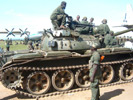
In a dramatic reversal of fortune for one of Central Africa’s most powerful warlords, Congolese rebel leader Laurent Nkunda was arrested by Rwandan authorities last night along the Congo-Rwanda border. When my colleague Rebecca and I met with Nkunda in the town of Rwanguba on Thanksgiving Day, he seemed on top of the world. His rebel movement, the National Congress for the Defense of People, or CNDP, had routed the Congolese army, embarrassed UN peacekeepers, consolidated control of a large swath of North Kivu province, and threatened the regional capital of Goma. Nkunda shrugged off allegations that his lieutenant, Bosco “The Terminator” Ntaganda, had directed a massacre of civilians in Kiwanja, and confidently demanded direct negotiations with Congolese President Laurent Kabila. Journalists flocked to his compound, diplomats had him on speed dial, and the UN appointed a former president of Nigeria to mediate a solution. This morning, Nkunda was in Rwandan custody, and it sounds like he is already back in Congo and headed for detention in the capital, Kinshasa. What happened?
The power play orchestrated by the Congolese and Rwandan governments has been brewing for weeks. As Nkunda’s power and ambition grew, the governments of both Rwanda and Congo came to see him as a serious problem, albeit for different reasons. Unable to defeat Nkunda militarily and unwilling to treat him as a legitimate political actor, President Kabila needed Rwanda’s help to neutralize him. Rwandan President Paul Kagame was stung by Nkunda’s increasingly bold pronouncements (particularly his ambition to take his fight all the way to Kinshsa) and a U.N. panel of experts report documenting Rwandan support for CNDP and involvement with conflict minerals in eastern Congo. European donors began to threaten aid money and Rwanda no longer had plausible deniability that it was not involved with Nkunda.
Congolese officials sought Rwandan help to get rid of Nkunda. The quid pro quo: the Rwandan military would be allowed to re-enter eastern Congo to hunt down the Democratic Forces for the Liberation of Rwanda, or FDLR, a Rwandan Hutu rebel group led by commanders responsible for the 1994 Rwanda Genocide. In a fantastically cynical move, the two sides also agreed that indicted war criminal Bosco Ntaganda would replace Nkunda as head of CNDP, and that his forces would join in the offensive against the FDLR.
A week ago in Goma, Ntaganda announced that he had taken control of CNDP and would collaborate with the Congolese and Rwandan armies against the FDLR. As reported on this blog earlier this week, more than 3,000 Rwandan troops crossed into eastern Congo this past weekend, isolating Nkunda and ultimately arresting him. My colleague John Prendergast noted in the New York Times today, “Now the hard part begins.”
While the move to take more aggressive action to remove the FDLR from eastern Congo and arrest of Nkunda are welcome developments and could contribute mightily to a lasting peace in eastern Congo, there are lots of reasons to be profoundly apprehensive.
- The planned operations against the FDLR have the potential to be catastrophic for Congolese civilians. The Congolese army and Rwandan armies have abysmal track records in protecting civilians, and the FDLR will almost certainly not stand their ground and fight. As they have done in the past (and as the Lord’s Resistance Army has done in northeastern Congo), the FDLR may well melt into the bush, leave civilians to bear the brunt of the offensive, and return with a vengeance when the operation is over. Moreover, Congo and Rwanda have clear economic motive to assert control over valuable mines in FDLR controlled areas. This could be why the UN peacekeeping force charged with protecting civilians in eastern Congo has been kept deliberately in the dark and is now restricted from traveling to certain areas.
- The role of Bosco “The Terminator” Ntaganda sends a chilling message about the lack of accountability for crimes against humanity. Ntaganda is wanted for war crimes by the International Criminal Court, and the Congolese government, a signatory to the Rome Statute that established the ICC, is in full violation of international law by failing to arrest him. Human Rights Watch has documented his role in recent massacres.
- Even though Nkunda has been arrested, allowing Rwandan troops back onto Congolese soil is a dangerous gamble for Congolese President Kabila. Many people in eastern Congo loathe Rwanda for its behavior during the wars that ripped the country apart from 1996 to 2002, when they failed to dislodge the FDLR while looting substantial mineral wealth. The Rwandan military has been able to inflict substantial casualties on the FDLR on the past, but never to the point where they were able to break them as a force. The longer Rwandan forces remain in eastern Congo, the more vulnerable Kabila will be to internal challenges.
- Lastly, and as Enough has consistently argued, even a successful operation against the FDLR must be accompanied by a process to deal with the other major root causes of conflict in eastern Congo: the fight for control over lucrative natural resources, access to land, economic and physical security of ethnic minorities (particularly Tutsis), and contentious debates over citizenship and identity.
Events are unfolding rapidly on the ground, and Enough is preparing on a statement with recommendations for policymakers on how to help avoid the situation from spiraling downward. We will release the statement next week, but as a first step the Obama administration should immediately appoint a special envoy to the Great Lakes region. The administration has not yet named its Africa policy team, but the people of eastern Congo cannot wait another day for the United States to get engaged at a high level.

